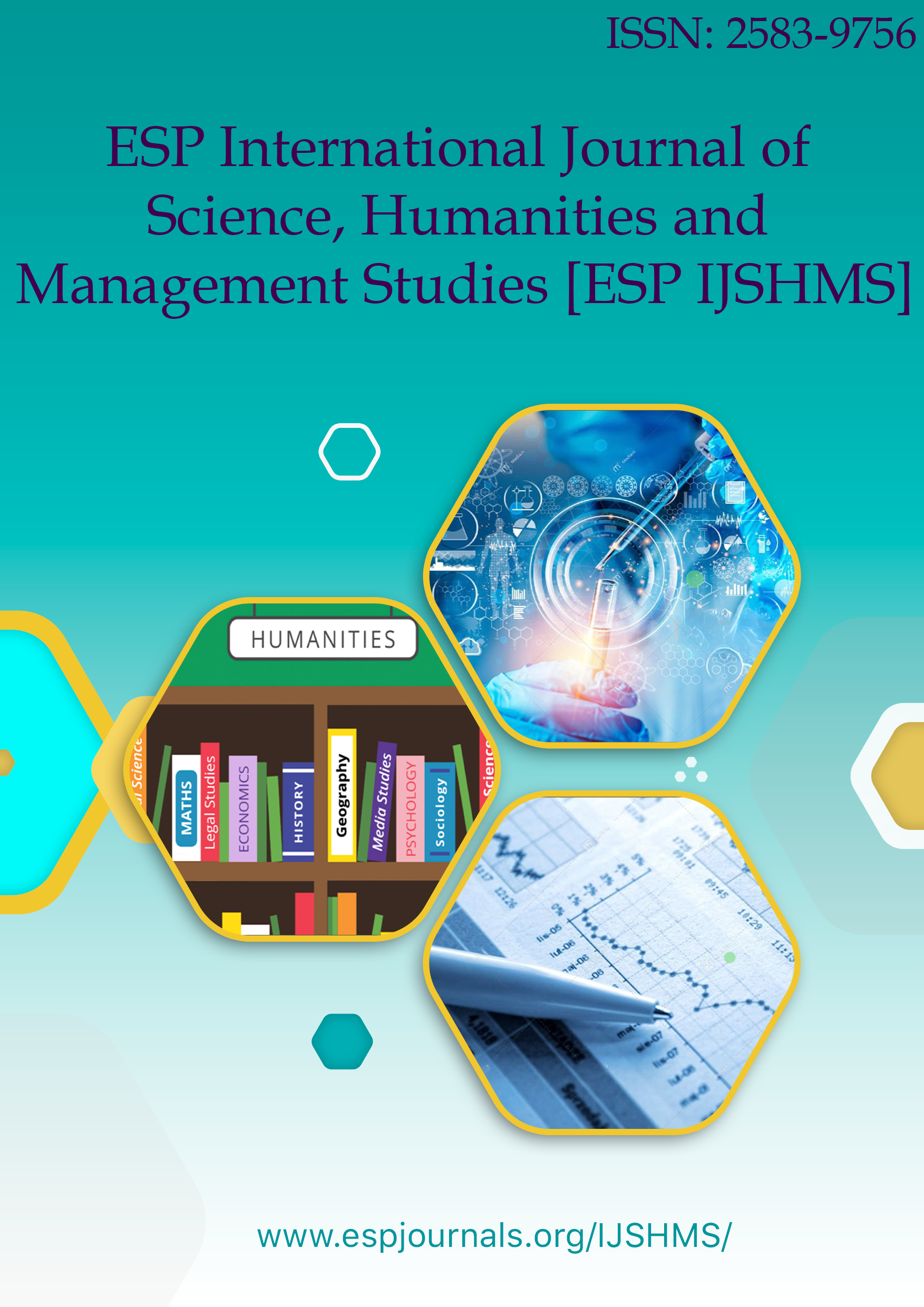ESP International Journal of Science, Humanities & Management Studies(ESP-IJSHMS)
Citation :
Muktar Toyib Usmen, Irshad Ahmad, 2024. "Navigating the Waters: A Hegemonic Stability Theory Analysis of the Grand Ethiopian Renaissance Dam and its Impact on Hydro-Politics in the Nile Basin" ESP International Journal of Science, Humanities & Management Studies(ESP-IJSHMS) Volume 2, Issue 1: 65-72.
Abstract :
The Grand Ethiopian Renaissance Dam (GERD) signifies a critical milestone in the intricate landscape of transboundary water management within the Nile Basin, inciting a contentious discourse among key stakeholders, notably Ethiopia, Egypt, and Sudan. Positioned as Ethiopia's ambitious endeavor to challenge Egypt's established hydro-hegemony, the GERD aims to fulfill developmental and strategic objectives, underscoring the need for a comprehensive examination of the hydro politics in the region. This review employs Hegemonic Stability Theory as a lens to delve into historical and legal facets of Nile water management, dissect the political and economic ramifications of the GERD for riparian states, and assess the potential for cooperation and conflict resolution within the Nile Basin.
Drawing from the tenets of Hegemonic Stability Theory, a foundational framework in international relations, this analysis elucidates Egypt's role as the hydro-hegemon in the Nile Basin. The theory accentuates the significance of a dominant power supplying public goods to uphold international stability, a role historically assumed by Egypt through control over the majority of the Nile's water resources. Rooted in colonial-era agreements and diplomatic influence, Egypt has safeguarded its interests and maintained the uninterrupted flow of the Nile.
The GERD emerges as a formidable challenge to Egypt's hydro-hegemony, reflecting Ethiopia's aspirations to harness the Blue Nile's hydropower for its development. This ambition, however, contrasts sharply with Egypt's apprehensions regarding potential water scarcity and alterations in river dynamics. The GERD disrupts the established equilibrium, instigating uncertainty, particularly for downstream states like Egypt and Sudan, with far-reaching impacts on agriculture, industry, and livelihoods.
The consequences of this challenge extend beyond the immediate stakeholders. The GERD holds the potential to redefine norms of cooperation within the Nile Basin, transitioning from a historical backdrop of hydro-hegemony towards principles of equitable utilization and benefit-sharing. Resolving this complex scenario necessitates either a restoration of Egypt's power and legitimacy through addressing its concerns and compensating for adverse impacts or the establishment of a new order accommodating the interests of all riparian states. This juncture is pivotal, with the outcome determining the future stability and cooperation within the Nile Basin.
References :
[1] Cascao, Ana Elisa, and Alan Nicol. “GERD: New Norms of Cooperation in the Nile Basin?” Water International, vol. 42, no. 5, 2017, pp. 516-533.
[2] Elhance, Arun P. Hydropolitics in the Third World: Conflict and Cooperation in International River Basins. United States Institute of Peace Press, 1997.
[3] Folch, Christine. Hydropolitics: The Itaipu Dam, Sovereignty, and the Engineering of Modern South America. Princeton University Press, 2019.
[4] Gilpin, Robert. War and Change in World Politics. Cambridge University Press, 1981.
[5] Meissner, Richard. “Hydropolitics: Conflicts over Water as a Development Constraint.” Zed Books, 1999.
[6] Mollinga, Peter P. “Water and Politics: Levels, Rational Choice and South Indian Canal Irrigation.” Futures, vol. 33, no. 8-9, 2001, pp. 733-752.
[7] Salman, Salman M. A., and Kishor Uprety. Conflict and Cooperation on South Asia’s International Rivers: A Legal Perspective. World Bank Publications, 2002.
[8] Swain, Ashok, and Anders Jägerskog. “Emerging Powers and Transboundary Water: The Case of the Nile.” Oxford Research Encyclopedia of Politics, 2017, doi:10.1093/acrefore/9780190228637.013.77.
[9] Tvedt, Terje, ed. The River Nile in the Post-Colonial Age: Conflict and Cooperation among the Nile Basin Countries. I.B. Tauris, 2010.
[10] Verhoeven, Harry. “Behind the Nile Dam Dispute: Political Leadership and the Quest for Economic Development in Ethiopia and Egypt.” International Affairs, vol. 96, no. 2, 2020, pp. 321-337.
[11] Waterbury, John. Hydropolitics of the Nile Valley. Syracuse University Press, 1979.
[12] Wheeler, Kevin, et al. “Cooperative Filling Approaches for the Grand Ethiopian Renaissance Dam.” Water International, vol. 45, no. 2, 2020, pp. 105-125.
[13] Yihdego, Zeray, and Alistair Rieu-Clarke. “An Exploration of Fairness in International Law through the Blue Nile and GERD.” Water International, vol. 41, no. 4, 2016, pp. 528-549.
[14] Zeray, Yacob, and Yohannes Aberra. “The Grand Ethiopian Renaissance Dam: An Opportunity for Collaboration and Shared Benefits in the Eastern Nile Basin.” Global Dialogue Review, vol. 6, no. 1, 2018, pp. 54-63.
[15] Zeitoun, Mark, and Jeroen Warner. “Hydro-hegemony – a Framework for Analysis of Trans-boundary Water Conflicts.” Water Policy, vol. 8, no. 5, 2006, pp. 435-460.
[16] Cascao, Ana Elisa, and Alan Nicol. “GERD: New Norms of Cooperation in the Nile Basin?” Water International, vol. 42, no. 5, 2017, pp. 516-533. 4.
[17] Verhoeven, Harry. “The Politics of African Energy Development: Ethiopia’s Hydro-Agricultural State-Building Strategy and Clashing Paradigms of Water Security.” Philosophical Transactions of the Royal Society A: Mathematical, Physical and Engineering Sciences, vol. 378, no. 2178, 2020, p. 20190522. 5.
[18] Yihdego, Zeray, and Alistair Rieu-Clarke. “An Exploration of Fairness in International Law through the Blue Nile and GERD.” Water International, vol. 41, no. 4, 2016, pp. 528-549. 6.
[19] Wheeler, Kevin, et al. “Cooperative Filling Approaches for the Grand Ethiopian Renaissance Dam.” Water International, vol. 45, no. 2, 2020, pp. 105-125. 3.
[20] Zeray, Yacob, and Aberra Mogessie. “The Grand Ethiopian Renaissance Dam: A Benefit-Sharing Project in the Eastern Nile Basin?” Sustainability, vol. 10, no. 2, 2018, p. 494. 4.
Keywords :
Grand Ethiopian Renaissance Dam (GERD), Nile Basin, Hydropolitics, Hegemonic Stability Theory.


 : 10.56472/25849756/IJSHMS-V2I1P107
: 10.56472/25849756/IJSHMS-V2I1P107